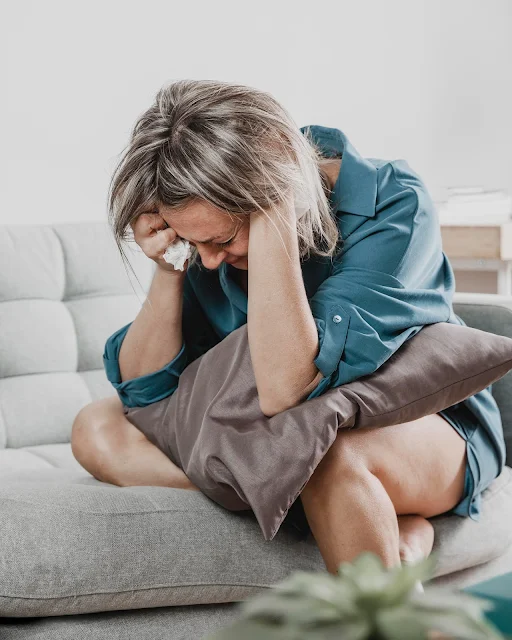In today's fast-paced world, stress and anxiety have become all too common. From work deadlines to personal pressures, it's easy to feel overwhelmed. However, managing stress and anxiety doesn't have to be complicated. In fact, there are many simple and effective techniques you can incorporate into your daily routine to help you feel calmer and more centered. As a top health coach, I've compiled a list of 16 easy strategies to help you relieve stress and anxiety and reclaim your peace of mind.
1. Practice Deep Breathing:
One of the quickest and most effective ways to reduce stress and anxiety is by practicing deep breathing exercises. Take slow, deep breaths in through your nose, allowing your diaphragm to expand, and exhale slowly through your mouth. This simple technique can help activate your body's relaxation response and calm your mind.
2. Take Regular Breaks:
It's essential to give yourself regular breaks throughout the day, especially during busy or stressful periods. Step away from your desk, take a short walk outside, or simply close your eyes and practice mindfulness for a few minutes. These breaks can help refresh your mind and body, allowing you to return to your tasks with renewed focus and energy.
3. Get Moving:
Exercise is a powerful stress reliever, as it helps release endorphins, which are natural mood lifters. Whether it's going for a run, practicing yoga, or taking a dance class, find a physical activity that you enjoy and make it a regular part of your routine. Even just a few minutes of movement each day can make a significant difference in your stress levels.
4. Prioritize Sleep:
Adequate sleep is crucial for managing stress and anxiety. Make sure you're getting seven to nine hours of quality sleep each night by establishing a relaxing bedtime routine. Avoid screens and stimulating activities before bed, and create a comfortable sleep environment that promotes restful sleep.
5. Practice Mindfulness Meditation:
Mindfulness meditation involves focusing your attention on the present moment without judgment. By practicing mindfulness regularly, you can train your mind to become less reactive to stressors and more resilient in the face of challenges. Start with just a few minutes of meditation each day and gradually increase the duration as you become more comfortable.
6. Limit Caffeine and Alcohol:
While it may be tempting to reach for caffeine or alcohol when you're feeling stressed, these substances can actually exacerbate anxiety symptoms. Limit your intake of caffeine and alcohol, especially in the hours leading up to bedtime, to ensure they don't interfere with your sleep or contribute to feelings of anxiety.
7. Cultivate Gratitude:
Practicing gratitude can help shift your focus away from stressors and toward the positive aspects of your life. Take a few moments each day to reflect on what you're grateful for, whether it's your health, relationships, or simply the beauty of nature. Keeping a gratitude journal can be a helpful way to cultivate a mindset of appreciation.
8. Establish Boundaries:
Setting boundaries is essential for protecting your mental and emotional well-being. Learn to say no to requests or commitments that overwhelm you, and prioritize activities that bring you joy and fulfillment. By establishing clear boundaries, you can prevent burnout and maintain a healthy balance in your life.
9. Connect with Others:
Social support is a powerful antidote to stress and anxiety. Make time to connect with friends, family members, or supportive peers on a regular basis. Whether it's through phone calls, video chats, or in-person gatherings, nurturing your relationships can provide comfort and perspective during challenging times.
10. Practice Progressive Muscle Relaxation:
Progressive muscle relaxation is a relaxation technique that involves tensing and then relaxing each muscle group in your body systematically. Start with your toes and work your way up to your head, focusing on releasing tension with each exhale. This technique can help promote relaxation and reduce physical symptoms of stress.
11. Engage in Creative Activities:
Engaging in creative activities like painting, writing, or gardening can be incredibly therapeutic for reducing stress and anxiety. Allow yourself to express your thoughts and emotions through creative outlets, and enjoy the process without worrying about the outcome. Creativity can provide a welcome distraction from stressors and promote a sense of accomplishment.
12. Practice Self-Compassion:
Be kind to yourself, especially when you're feeling stressed or anxious. Practice self-compassion by acknowledging your struggles without judgment and offering yourself words of kindness and encouragement. Treat yourself with the same compassion and understanding that you would offer to a friend in need.
13. Spend Time in Nature:
Spending time in nature has been shown to have a calming effect on the mind and body. Take advantage of opportunities to get outdoors, whether it's going for a hike in the woods, strolling through a park, or simply sitting in your backyard. Connecting with nature can help reduce stress and promote feelings of relaxation and well-being.
14. Listen to Music:
Music has the power to soothe the soul and alleviate stress and anxiety. Create a playlist of your favorite calming songs or instrumental music, and listen to it whenever you need a mood boost. Experiment with different genres and styles to find what works best for you, whether it's classical, jazz, or nature sounds.
15. Practice Visualization:
Visualization is a technique that involves imagining yourself in a peaceful and relaxing environment. Close your eyes and visualize yourself in a place where you feel safe and serene, whether it's a beach, a forest, or a cozy cabin in the mountains. Allow yourself to fully immerse in the sights, sounds, and sensations of this imaginary place, and feel your stress melt away.
16. Seek Professional Help:
If you're struggling to manage your stress and anxiety on your own, don't hesitate to seek professional help. A therapist or counselor can provide you with the support and guidance you need to develop coping strategies and improve your mental well-being. Remember, asking for help is a sign of strength, not weakness.
Conclusion:
Incorporating these simple strategies into your daily routine can help you better manage stress and anxiety and improve your overall well-being. Remember that managing stress is a journey, and it's okay to experiment with different techniques to find what works best for you. By prioritizing self-care and implementing healthy coping strategies, you can cultivate greater resilience and enjoy a more balanced and fulfilling life.


Comments
Post a Comment